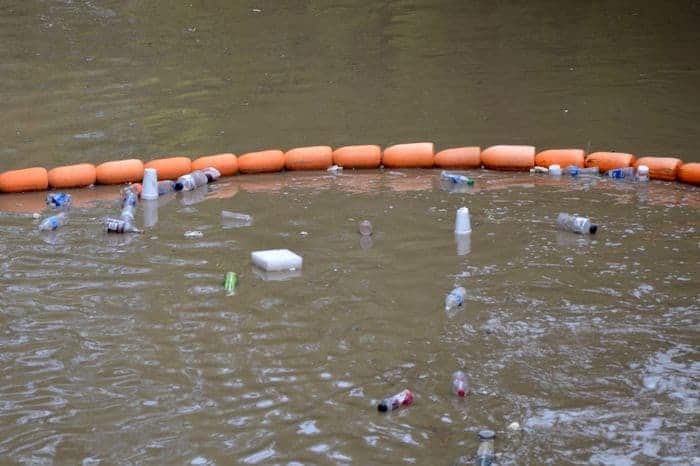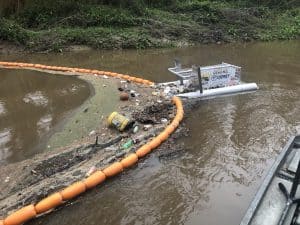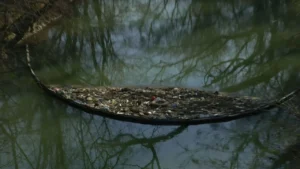At a massive culvert under 7th Street North in Birmingham, the underground springs flowing beneath the city’s downtown corridor emerge to see the light of day, becoming Valley Creek, a major tributary of the Black Warrior River.
For years it was one of the most heavily littered spots in the city, as thousands of bottles, cans, bags and anything else that washed into the downtown storm drains were carried off to begin the long journey to the Gulf. The trees lining the creek were once littered with the tattered remains of plastic shopping bags and caution tape washed down from the city.
Now, the trees are litter free and a “Litter Gitter” device is in place, trapping the trash, where it is sorted, counted and recycled if possible, instead of being allowed to float downstream.
The Valley Creek site is one of eight in the Birmingham area to feature these Litter Gitters, made possible by a consortium of local conservation groups, with funding from the U.S. Environmental Protection Agency and local businesses and governments. The project was spearheaded by the Freshwater Land Trust, a Birmingham-based conservation group that manages more than 7,500 acres of sensitive land in Alabama and developed the popular Red Rock Trail system in Jefferson County.
“This is truly a joint effort, and we have come together to try to do everything we can to remove trash from our waterways,” Rusha Smith, executive director of the Freshwater Land Trust, said Friday at a press event on the Valley Creek site. “In the last two months, we’ve kept more than 500 pounds of trash out of our waterways.”

EPA Region 4 Administrator Mary S. Walker attended the Friday event, touting the Birmingham project as a success under the agency’s Trash Free Waters initiative, which funds litter reduction projects across the country.
“Personally, I love these projects because I think that it is the best way to bring partners together on a very tangible water quality matter where everyone can engage, and everyone can see the results of their work.”
Plastic pollution is a growing worldwide problem, as disposable products end up increasingly clogging the world’s rivers and streams, on their way to the oceans. One recent study projected that by 2050, given current trends, the oceans will contain more plastic than fish.
Walker said it’s been estimated that between 11 and 28 billion pounds of plastic trash enters the world’s oceans each year.
“Projects like these educate people and make them aware that our individual actions have an impact on water quality, and genuinely make a difference in our communities,” Walker said.
A $500,000 EPA grant covered installation and three years of maintenance and emptying the traps for six of the Litter Gitters. The city of Homewood sponsored a seventh trap on Griffin Brook, and the Coca-Cola Foundation and River Network funded one in Birmingham’s East Lake.

The Valley Creek trap was installed in December 2019 as a pilot project, organized by the Freshwater Land Trust and funded by the Coca-Cola Foundation and the River Network, a nationwide conservation group based in Portland, Ore. Those groups funded the project for the first three months, then the city of Birmingham provided an additional four months of funding. Since July, the maintenance of the trap has been funded by the EPA grant.
The traps are designed, maintained and emptied by the Osprey Initiative, which has one full-time, Mitch Lowe, and two part-time employees in Birmingham to maintain the traps.
They consist of a metal cage floating on two pontoons. Ropes tied to either side of the creek direct floating debris into the cage, where much of it can be removed if it’s not natural.

Lowe said the traps are emptied once or twice a week, depending on rainfall. In addition to emptying the traps and recycling the plastic bottles and cans, the group is also collecting data on what kind of trash ends up in the river, which can be used for educational programs and to try to stop the trash from entering creeks in the first place.
“It’s data that we’ve never had before, just to kind of break down what is actually going on,” Lowe said. “We can say this is what we actually found in the creek, 70% styrofoam at this site, or this is all single use plastics or whatever it is.”
Emptying a trap takes his three-person team about 90 minutes, he said, and can lead to some strange discoveries.
“We’ll find diapers from time to time, really more fruit than you would expect, apples or an onion in there,” Lowe said. “It freaks us out, we’ll find baby dolls all the time just staring at you.”
Local environmental groups Black Warrior Riverkeeper and Cahaba Riverkeeper joined as partners in the initiative to help protect their respective watersheds. Five of the traps are in the Black Warrior watershed, and three are on tributaries to the Cahaba.
Black Warrior Riverkeeper Nelson Brooke said plastic pollution is a big problem in the watershed, and that he hopes the program will continue expanding.
“That’s one of the biggest complaints we get is people who live on or use the river downstream are just overwhelmed by the staggering amount of trash that’s making its way into the river,” he said. “We’re super pumped to see this be the beginning of what we hope is going to blossom into an even larger effort.”
This story originally appeared on AL.com by Dennis Pillon. Read the original story here.




